
Employee Experience
The other COVID-19 crisis: Mental health
Social isolation, employment uncertainty, and the virus itself have combined to shock the health and wellbeing of employees around the world. And while leaders are rightly focused on the physical effects of the COVID-19 pandemic, there’s another global challenge emerging: mental health.
Below are the findings from a study of more than 2,000 employees conducted at the end of March and early April 2020 in Australia, France, Germany, New Zealand, Singapore, the UK and the US.
The mental health shock
Two out of five (41.6%) of respondents said that their mental health has declined since the COVID-19 outbreak. The number of people who rated the state of their mental health in the lowest range (3 or under on a 10-point scale) has doubled since the outbreak began.
Moving to a new remote or alternative work arrangement impacts employees’ mental health significantly:
- 44.4% of those who are now working from home say their mental health has declined.
- Newly remote workers are 30% more likely than those still employed in any other setting (office, non-traditional office setting, self-employed, etc.) to say their mental health has declined.
- Unemployed workers have the highest proportion of mental health declines (48.5%) followed by newly remote workers (44.4%), and then all other employed workers (34.1%).
- The unknown may have a bigger impact on mental health than even getting losing one’s job. Furloughed workers are 37% more likely than those who have been laid off to report declines in mental health
- For those who have worked from home for more than 2 weeks, they are 50% more likely to say that their mental health has declined due to “more chronic sadness” and “more fatigue”
Mental health is suffering about the same at all levels of organizations:
- 44.0% of individual contributors report decreased mental health
- 40.5% of C-level employees report decreased mental health
- 40.1% of managers report decreased mental health
Workers report lower average mental health and significantly lower “lows” since the outbreak began.
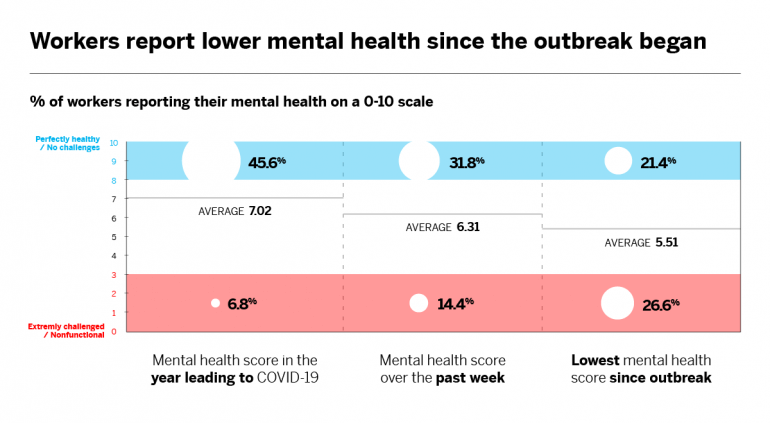
Respondents who said their mental health had declined were asked what things had had the biggest impact on that decline. The top five reasons were:
- More anxiety (24.0%)
- More stress (20.1%)
- Worry about losing their job (14.2%)
- Being less busy (8.6%)
- Challenges of working from home (8.5%)
Stress and anxiety
We asked workers to report on different aspects of their mental health.
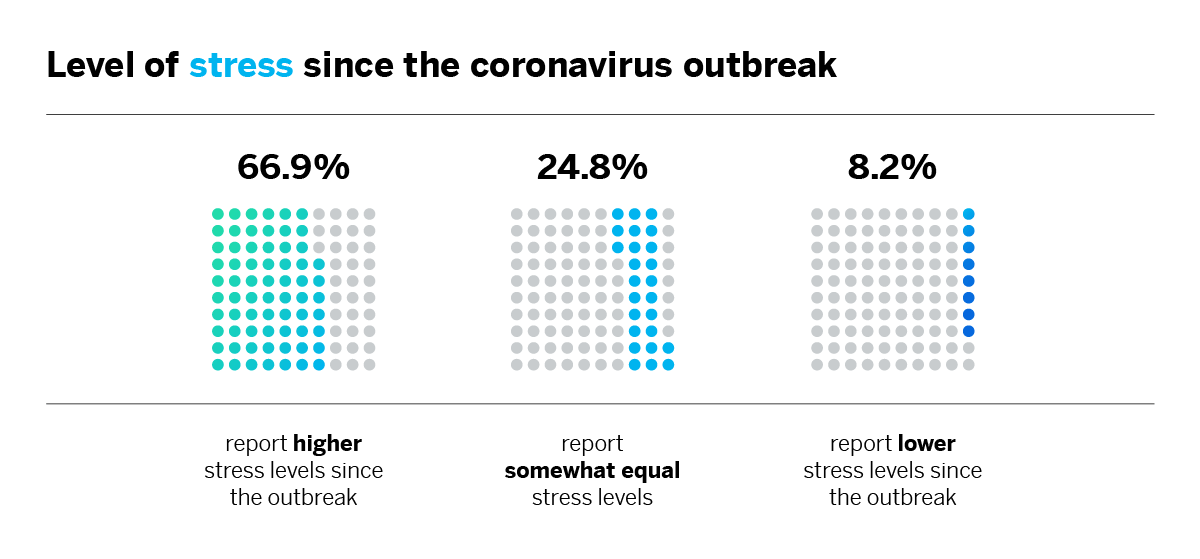
Stress: Stress has increased for the vast majority of people since the COVID-19 outbreak: 65.9% of people report higher levels of stress since the outbreak, while only 8.2% say their stress levels have declined.
When asking what is contributing most to their increased stress levels, people listed the following:
- Contracting COVID-19
- Financial pressure
- Being stuck at home
- Loneliness / social isolation
- Fears about job security
Anxiety: Anxiety has increased for the majority of people since the COVID-19 outbreak: 57.2% of people report higher levels, and only 6.9% say their anxiety levels have declined.
79.5% of those newly homeschooling their children report increased anxiety since the outbreak compared to 53.9% amongst other parents.
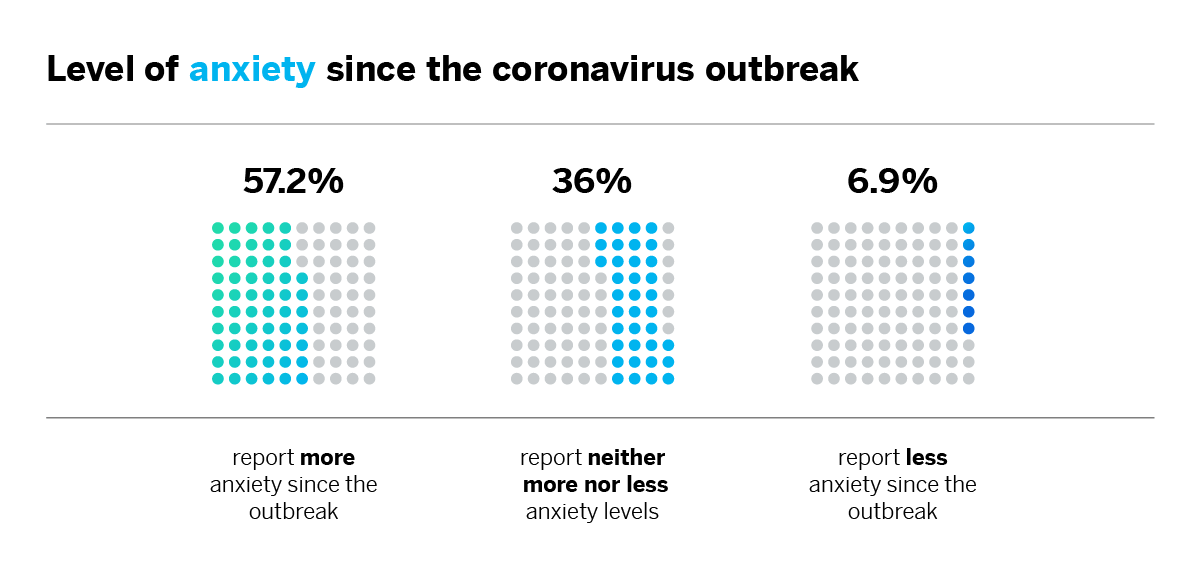
Symptoms
Mental health challenges manifest in a number of interrelated ways. More than half of people say they are more emotionally exhausted, feel increased sadness, or are more irritable. Employees report the following symptoms have increased since the COVID-19 outbreak began:
- 53.8% report being more emotionally exhausted
- 53.0% report increased feeling of sadness in day to day life
- 50.2% report being more irritable
- 42.9% report feeling generally more confused
- 38.1% report increased insomnia
- 32.3% report increased anger
- 24.4% report increased feelings of guilt
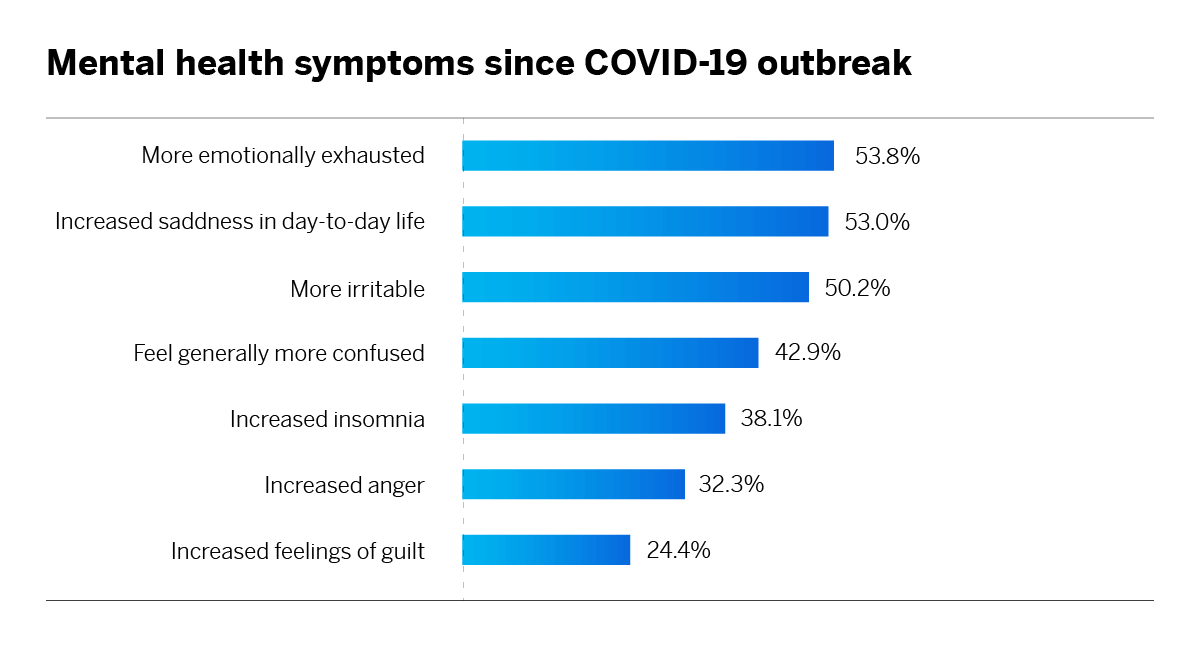
Self isolation
With most of the world under some kind of restricted movement, social isolation is one of the biggest mental health challenges: 75.2% feel more socially isolated than they did before the outbreak.
The top reasons cited for feeling more socially isolated include:
- Spending most of my day in my home
- Less in-person interaction
- Disruption or unavailability of my usual social outlets
People who have been working remotely for the longest are more likely than others to say that their social isolation is caused by:
- Stressed relationship with their family (25%)
- Repeated in-person interactions with the same people (12%)
Living situation
With so much time now spent at home, the people workers interact with can have significant effects on mental health.
- Compared with parents whose children are attending virtual classrooms, people who are newly homeschooling their children are:
- 47% more likely to report increased anxiety
- 27% more likely to report increased stress since the pandemic began
- Couples where both partners are now working from home are 45% more likely to report that their mental health has improved since before the coronavirus outbreak. They are also 30% more likely to say their productivity has increased since before moving to remote work.
- 46.9% of people say their pets decrease their anxiety
Productivity
The top five mental health challenges affecting productivity since the outbreak began include:
- Difficulty concentrating (28.3%)
- Taking longer to do task (20.0%)
- Difficulty thinking reasoning or deciding (14.7%)
- Putting off challenging work (12.4%)
- Difficulty juggling tasks or responsibilities (11.8%)
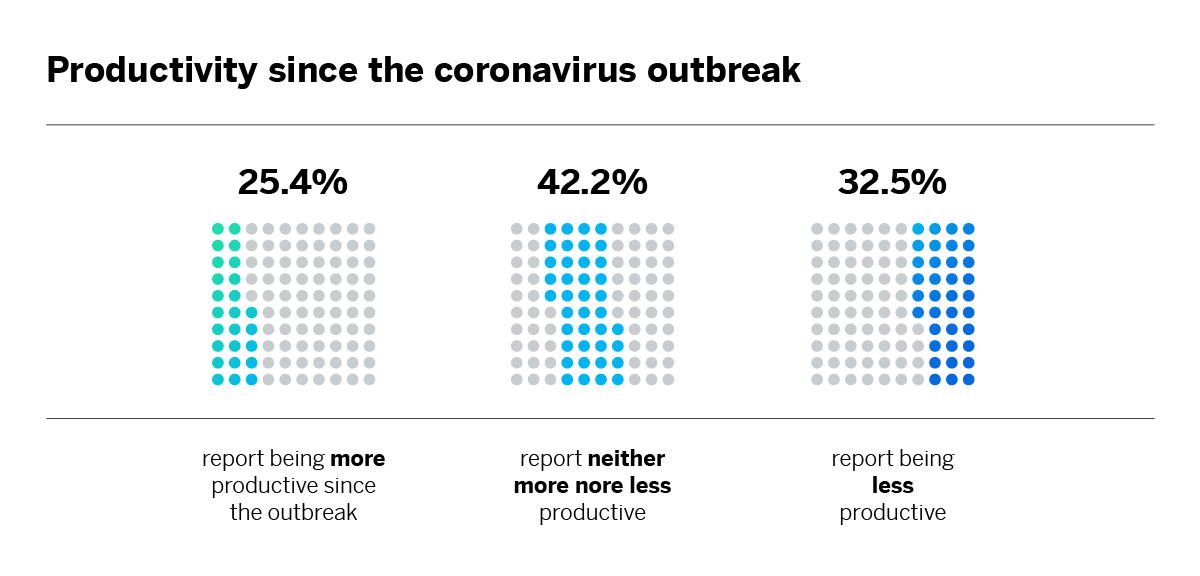
How to respond
The data shows that companies’ and managers’ actions can improve wellbeing and mitigate some of the negative effects of COVID-19 outbreak on workers. They must be willing to listen and then act.
Managers must care (and act) personally
Managers have a critical role to play in addressing the mental health crisis. They are employees’ direct connection to the company, and their actions can either exacerbate or alleviate workers’ mental health challenges. Some have risen to this challenge. Many have not.
- 38.2% of people say their company has not even asked them if they are doing okay, and these people are 38% more likely to say their mental health has declined.
- Those who said their company has reached out indicated that a direct call from their manager was the most effective way to check in. More than half (57.7%) of workers are comfortable with their manager proactively asking them about their mental health, and 41.0% want their manager to proactively ask them; 44.0% felt comfortable bringing it up with their manager themselves.
Caring is important, but it is just a start.
- 64.3% of workers say their manager cares about them as a human being. Those who say their manager doesn’t care about them as a human being are twice as likely to be extremely worried about losing their job. And among those who have struggled with working from home, those who say their manager doesn’t care about them as a human being are more than twice as likely to be planning on quitting and over three times more likely to want to quit, but feel like they can’t in the current economic situation.
- Less than half (47.1%) said their manager is attuned to their well-being. Those who say their manager is not attuned to their well-being are 69% more likely to say their mental health has declined since the outbreak began, and 61% more likely to say they’ve been less productive.
- Only two out of five (39.7%) feel supported by their manager. Those who don’t feel supported by their manager are 48% more likely to cite worry about their job as a primary reason their mental health has declined. Among those who have struggled with working from home, those who do not feel supported by their manager are over three times as likely to want to quit but won’t in the current economic situation.
Cohesive teams also help. When asked who could help them the most if they had a discussion about their mental health, coworkers rose to the top.
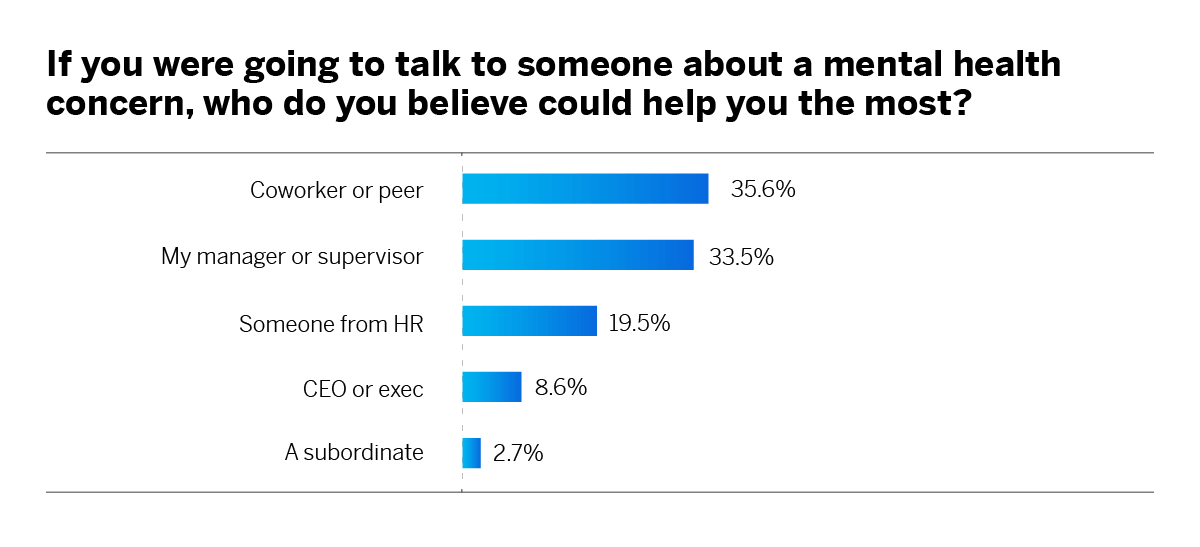
Be transparent
Managers and the company can help employees deal with their mental health issues by communicating well, setting clear expectations and taking action to address the needs of their employees.
- Three out of five (58.4%) said their manager talks to them about changes and how they affect them. Employees whose manager is not good at communicating are 23% more likely to experience mental health declines.
- 54% say their companies have been doing well at listening their needs.
- 59.3% feel their company has done well at taking action to address their needs. These employees are 28% more likely to report that their mental health has improved since the coronavirus outbreak.
One in nine (11.3%) employees say their company has not communicated with them at all regarding the coronavirus outbreak. Of those who have received communications:
- 70.6% say that company communications have provided them with the information they needed to continue in their role.
- 66.2% say the communications from their company around coronavirus have been helpful to them in understanding what they need to do (safety and wellness guidelines, access to benefits, work-from-home best practices, etc.)
- 65.8% say that company communications have provided them with information that helps them feel more confident in the actions they can take for their own well-being.
When respondents were asked how often they would like to receive communications from their company about the coronavirus situation, the vast majority (91.5%) agreed at least once a week.
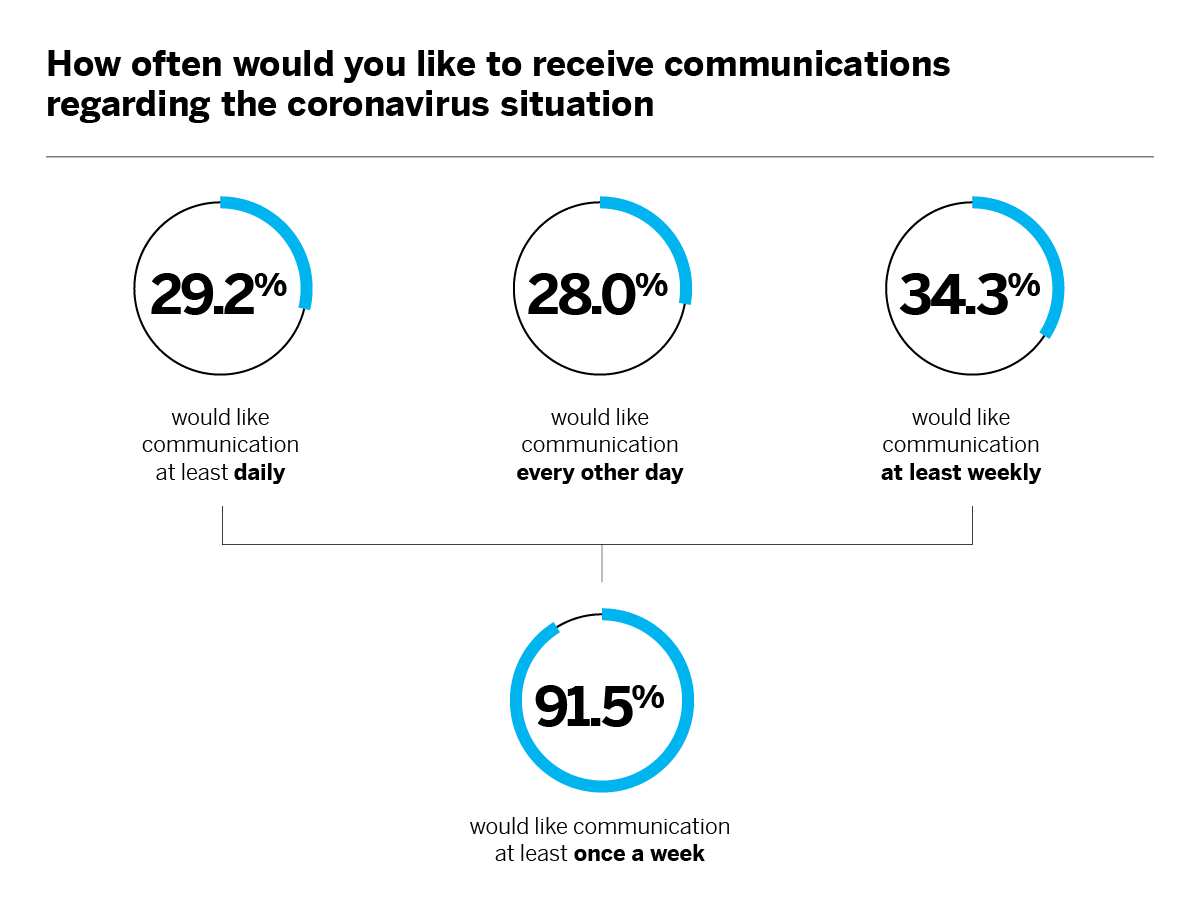
Set expectations
Those who have a clear understanding of what is expected of them when working from home are 30% more likely to have been more productive since the switch to remote work, and they are also 47% more likely to be not worried at all about losing their job. Those without clear expectations are 75% more likely to want to quit or be planning to quit their jobs.
When asked what actions from their company or colleagues have been helpful for improving their mental health, the following reasons floated to the top:
- Communication from my company leadership
- Having access to the resources I need to do my job effectively
- Clear expectations for my work from my manager
Provide resources
Pointing to available mental health resources is a positive step. Those who say their company has proactively shared mental health resources are 61% more likely to feel their company is communicating to them the information they need to look out for their own wellbeing. Yet nearly half of all workers (45.9%) say their company has not proactively shared what mental health resources are available.
Listening and helping employees
While it’s unclear how long social distancing and remote work will be the norm, it’s clear that both will continue to have profound effects on the workforce.
Now more than ever, organizations need to step up and help. At Qualtrics, we’ve made a number of services available to help businesses, educators and frontline healthcare workers take on the overwhelming challenges and realities shaping their work. For example, Remote + On-site Work Pulse is a free resource from Qualtrics that helps organizations navigate the new normal of teams working remotely for an extended period of time. The service helps managers stay better connected with employees and ensure they have what they need to succeed in this new environment.
This study was conducted as a partnership among Qualtrics, SAP, and Mind Share Partners
eBook: The HR leader's success kit to enabling a remote workforce